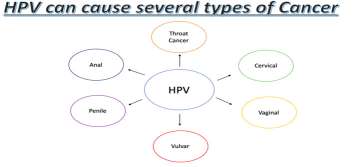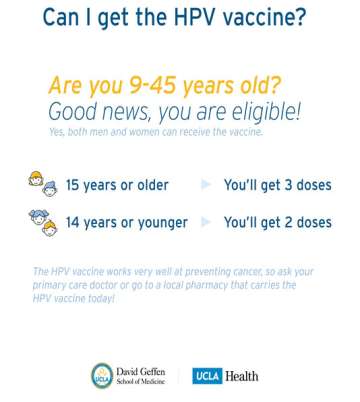What is HPV?
Find your care
Our head and neck surgeons consistently rank among the best in the nation. To find out more about our services, call 310-206-6688.
Patient Story: HPV p16 Throat Cancer Surgery at UCLA
Human Papilloma Virus (HPV), HPV Vaccine, and Throat Cancer Information
What is Human Papilloma Virus (HPV)?
Human papillomavirus, or HPV, is a ubiquitous virus that can infect anyone. Once you are infected, the virus lives in your mouth, throat, nose, genitals, or anus. There are many types of HPV and some are more dangerous than others. The dangerous types of HPV are labeled “high-risk” (e.g. HPV Types 16, 18, 31, 33) and the less dangerous types are labeled “low-risk” (e.g. HYP Types 6, 11). The high-risk HPV types can cause cancer, and the low-risk HPV types can cause warts.
What causes throat/ mouth cancer?
The main causes of throat/mouth cancer are:
- Human Papillomavirus (HPV) infection
- Smoking or chewing tobacco products
- Drinking excessive alcohol
- Betel nut chewing
What are the different areas of the mouth and throat that can get cancer?
- Tonsils (Oropharynx)
- Base of Tongue / Back of throat (Oropharynx)
- Mouth (Oral Cavity)
- Larynx / Voicebox
How common is HPV?
HPV is the most common sexually transmitted disease in the U.S. In fact, many people are exposed to oral HPV and about 10% of men and 3.6% of women have oral HPV. Most people clear it within one or two years.
What type of cancers does HPV cause?
- Throat (oropharynx) cancer. The oropharynx is the area in the back of your throat housing the tonsils, base of tongue, and posterior pharyngeal wall.
- Cancers of the female reproductive tract: Cervical cancer, Vaginal Cancer, Vulvar Cancer.
- Cancers of the male reproductive tract: Penile cancer
- Anal cancer

What types of warts does HPV cause?
HPV causes bothersome and even life-threatening warts in the nose, throat, voice box, airway, and mouth. This is also called respiratory papillomatosis. HPV also causes cauliflower-like warts in the genital region (vulva, penis), as well as anal region. These warts can turn into cancer and should be examined by a physician. Less dangerous low-risk types of HPV cause regular round warts you find on your hands and feet.
How do you get HPV?
HPV is spread from person to person in several ways:
- Sexual contact (contact involving the genitals, anus, and mouth)
a. The most common route of spreading high risk HPV strains - Mouth to mouth contact (like open mouth kissing or sharing a drink)
a. Less common but still possible to spread high risk HPV strains - Skin to skin contact (such as shaking hands)
a. Only transmits very low risk HPV strains that do not cause cancer
How do I know if I have HPV?
Most of the time HPV infection does not have any symptoms. Most people fight off the virus on their own without even knowing it, but for others, it can live in your body for years and may not show symptoms. There is no current screening test to see if you have an HPV infection of your mouth or throat. However, if you have a cervix, you should get pap smear testing every 3-5 years to make sure you do not have an HPV infection that may be turning into cervical cancer.
How do I know if I have HPV-related throat cancer?
You may experience symptoms such as:
- Lump in the neck
- Problems swallowing
- Problems speaking
- Pain in the neck or throat
- Unintentional weight loss
How are HPV-related throat cancers treated at UCLA?
Most HPV-related throat cancer is treated with either surgery, radiation, or both. Chemotherapy may also be added to the treatment if needed. Our UCLA Head and Neck Cancer Program (HNCP) will review your case and offer a personalized treatment that is right for you. Treatment recommendations are based on the size, location, growth pattern, and spread of your HPV-related throat cancer. Often times we use a surgical robot to assist us in surgery (called TORS, or Trans Oral Robotic Surgery) to safely and efficiently remove your cancer with less morbidity and complications. Please contact our Head and Neck Cancer Program (HNCP) at (310) 267-7076.
Is there a cure for HPV?
There are treatments for the cancers and warts caused by HPV, but it is not guaranteed to rid your body of the HPV infection. The good news is that there is a vaccine that prevents these types of cancers from ever happening in the first place. It is called the HPV vaccine.
Should I get the HPV vaccine?
The HPV vaccine can help decrease your risk of throat cancer, cervical cancer, vulvar cancer, penile cancer, and vaginal cancer. Ask your doctor about your eligibility.
Is the HPV vaccine safe?
The HPV vaccine has been shown to be safe through years of evidence showing us that it is safe. Minor side effects can be some skin redness, feeling dizzy afterwards, and a sore arm. However, it has been proven that the HPV vaccine does NOT cause any long-term side effects.
Will insurance cover my HPV vaccine?
Most insurances cover the HPV vaccine, especially if the person being vaccinated is between the ages of 18-26. If you are aged 27-45 years old, many insurances will also cover the HPV vaccine, but talk to your doctor about whether it will be covered.
Can I get the HPV vaccine?
If you are between the ages of 9 and 45 years old, the answer is yes! Both boys and girls / men and women in this age group are able to get the vaccine.
If you are below the age of 15, only 2 doses of the vaccine are needed
If you are above 15 years old, you will need 3 doses of the vaccine
The HPV vaccine works very well at preventing cancer, so ask your primary care doctor or go to a local pharmacy that carries the HPV vaccine today!

For More Information:
CDC:
NIH:
ACS (Cancer Society):
HPV Round-Table:
Vaccine information.Org:
American Head & Neck Society (Throat Surgeon Website):